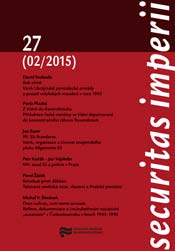Belzebub proti ďáblovi. Takzvaná sovětská mise, vlasovci a Pražské povstání
Beelzebub versus the Devil. The so-called Soviet mission, the Vlasov army and the Prague Uprising
Author(s): Pavel ŽáčekSubject(s): Military history, Security and defense, WW II and following years (1940 - 1949)
Published by: Ústav pro studium totalitních režimů
Keywords: Vlasov army;intelligence services;Soviet union
Summary/Abstract: The activities of the Soviet intelligence agencies, or units posing as such, remain a relatively unknown chapter in the Prague Uprising of May 1945. A specific role was played by the staff of senior Red Army lieutenant Vladimir Mechislavovich Radolinsky (1913–199?), one of the defenders of Odessa and a Romanian prisoner of war, who in spring 1944 moved to Prague, where he operated under the codename “Sokolov”. In the initial phase of the uprising, his group, referred to in period sources as a “Soviet (Russian) mission”, were involved in the broadcasting of rebel radio and in inviting the Vlasov army’s 1st Infantry Division of the Armed Forces of the Committee for the Liberation of the Peoples of Russia to Prague. As well as acquiring intelligence information, the “mission” held intensive negotiations with the Vlasov army and presented their demands with regard to the rebels’ military and political leadership. On the afternoon of May 7, 1945 Radolinsky even held talks with the division’s commander, Major General S. K. Bunyachenko, in Prague’s Jinonice. The following day his group, under pressure given the critical situation and the approach of German combat groups, again argued for the sending of a Vlasov army division to help Prague, even at the cost of ousting the Czech National Council. Despite the fact that Radolinsky established contact with Red Army organs on May 9, 1945 he was arrested by the SMERSH military counter-intelligence in connection with inviting “traitors of the nation” into the Czechoslovak capital. In later years he was persecuted for his war-time activities and operations in Prague.
Journal: Securitas imperii
- Issue Year: 2015
- Issue No: 27
- Page Range: 110-136
- Page Count: 27
- Language: Czech

